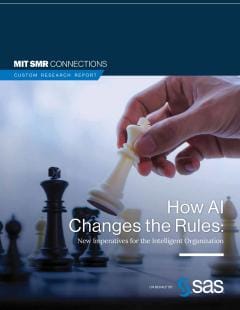White Paper
How AI Changes the Rules
New Imperatives for the Intelligent Organization

White Paper
New Imperatives for the Intelligent Organization
Many leaders are excited about AI’s potential to profoundly transform organizations by making them more innovative and productive. But implementing AI will also lead to significant changes in how organizations are managed, according to our recent survey of more than 2,200 business leaders, managers and key contributors. Those survey respondents, representing organizations across the globe, expect that reaping the benefits of AI will require changes in workplace structures, technology strategies and technology governance.to manage the significant changes to software development and deployment processes that most respondents expect from AI.
AI will drive organizational change and ask more of top leaders. The majority of survey respondents expect that implementing AI will require more significant organizational change than other emerging technologies including cloud. AI demands more collaboration among people skilled in data management, data analytics, IT infrastructure, and systems development, as well as business and operational experts. This means that organizational leaders need to ensure that traditional silos don’t hinder advanced analytics efforts, and they must support the training required to build skills across their workforces.
AI will place new demands on the CIO and CTO. AI implementation will influence the choices CIOs and CTOs make in setting their broad technology agendas. They will need to prioritize developing foundational technology capabilities, from infrastructure and cybersecurity to data management and development processes — areas in which those with more advanced AI implementations are taking the lead compared with other respondents. CIOs will also need to manage the significant changes to software development and deployment processes that most respondents expect from AI. The survey also indicated that many CIOs will be charged with overseeing or supporting formal data governance efforts: CIOs and CTOs are more likely than other executives to be tasked with this.
AI will require an increased focus on risk management and ethics. The Global survey shows a broad awareness of the risks inherent in using AI, but few practitioners have taken action to create policies and processes to manage risks, including ethical, legal, reputational, and financial risks. Managing ethical risk is a particular area of opportunity. Those with more advanced AI practices are establishing processes and policies for data governance and risk management, including providing ways to explain how their algorithms deliver results. They point out that understanding how AI systems reach their conclusions is both an emerging best practice and a necessity, in order to ensure that the human intelligence that feeds and nurtures AI systems keeps pace with the machines’ advancements.
The report that follows explores these findings in depth. Read on to learn more about the changes that leaders must prepare for to successfully implement trusted AI.